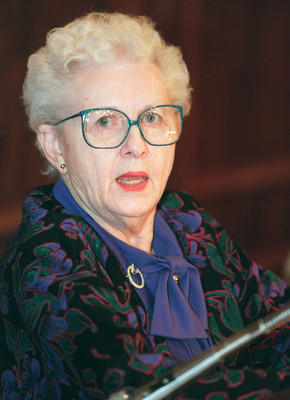Unpaid citizen lobbyist Thelma Clark had a secret weapon of persistence

It’s no exaggeration to say that Thelma Clark, an unpaid citizen lobbyist, probably did more for senior citizens who live in mobile homes than some legislators. Actually, she would have been a better legislator than a couple I can name.
When I met her in 1987, covering my first legislative session, she was already a veteran lobbyist. Her first session was in 1981 and in 1985 she had a 6-0 win record for passing bills to help mobile home owners. The white-haired 69-year-old with the vivid blue eyes didn’t have money to wine and dine legislators like the professional paid lobbyists did, but that didn’t mean she wasn’t effective. Her secret weapon: persistence.
Mobile homes and utilities were her main focus and she became the face and voice of Nevada seniors who struggled to keep up with higher electric, gas and power bills. She was the first winner of the “advocate’s advocate award” in 1986. Jon Wellinghoff, the first state consumer advocate, said he picked her because she was the one citizen who consistently stood up for average people at utility rate hearings.
“Somebody has to speak out, there’s too much apathy in the world,” Thelma said then.
Thelma kept speaking out. As recently as two years ago, she was working the phones for AARP issues at 88, despite illness and blindness.
Her death Sunday was noted by a tiny obituary in the Review-Journal, saying services will be at Palm Mortuary, 1325 N. Main St., at 10 a.m. today. Yet her impact on the Legislature was such that her death was announced on the Senate floor by Senate Majority Leader Steven Horsford, who said she would be missed for her advocacy as well as her gentle smile and sharp wit.
“I loved her because she was absolutely genuine and she wasn’t self-aggrandizing,” said Billy Vassiliadis, a powerhouse lobbyist and CEO of R&R Partners. “With Thelma it was all about ‘this is right and this is wrong, this is good for the community and this is bad.’ None of it was based on ‘What am I getting out of this,'” he said. “She was a one-person wrecking crew, and whether it was Bob Miller, Harry Reid or the school superintendent, they listened.”
“Thelma was always fighting for the rights of people she felt were marginalized,” said Victoria Riley, executive director of the Nevada Justice Association, describing Thelma as “upbeat and energetic, a lady to the core whose grace was only exceeded by her commitment and caring.”
Former Assemblyman Larry Spitler remembered, “Nothing stood in her way, no one was too big, nothing scared her. She knew the system and always had her facts prepared.”
Thelma didn’t become an activist until late in life. After her husband died in Illinois, she came to Las Vegas in 1967 and moved into a mobile home. She worked various jobs, from grocery store checker to food server at casinos.
Her activism was sparked by evictions at her mobile home park. She lobbied local government with no success. “I couldn’t get anything done with the county and city so I decided to bypass them and go to the Legislature,” she told me.
Scott Craigie, former chairman of the Public Utilities Commission and former chief of staff for Gov. Bob Miller, said she and her friend Vickie Demas were a lobbying team “who insisted people be given the humanity they deserved.”
“Thelma worked to create programs inside the public utilities to help seniors. She got laws passed that gave people extra time to pay their bills and passed statutes that forbid utilities from cutting off power in certain circumstances. She helped establish notice requirements. She helped craft a consumer bill of rights,” Craigie remembered.
“I think I make a difference,” she said in 1989 in that no-nonsense way of hers. “If I didn’t, I wouldn’t waste my time here.”
One of my favorite stories is how in the early 1980s, she wanted an appointment with Gov. Robert List, but he refused to schedule one. So Thelma just sat in the waiting room outside his office until he relented.
Thelma Clark was no quitter.
Jane Ann Morrison’s column appears Monday, Thursday and Saturday. E-mail her at Jane@reviewjournal.com or call (702) 383-0275. She also blogs at lvrj.com/blogs/morrison/.












